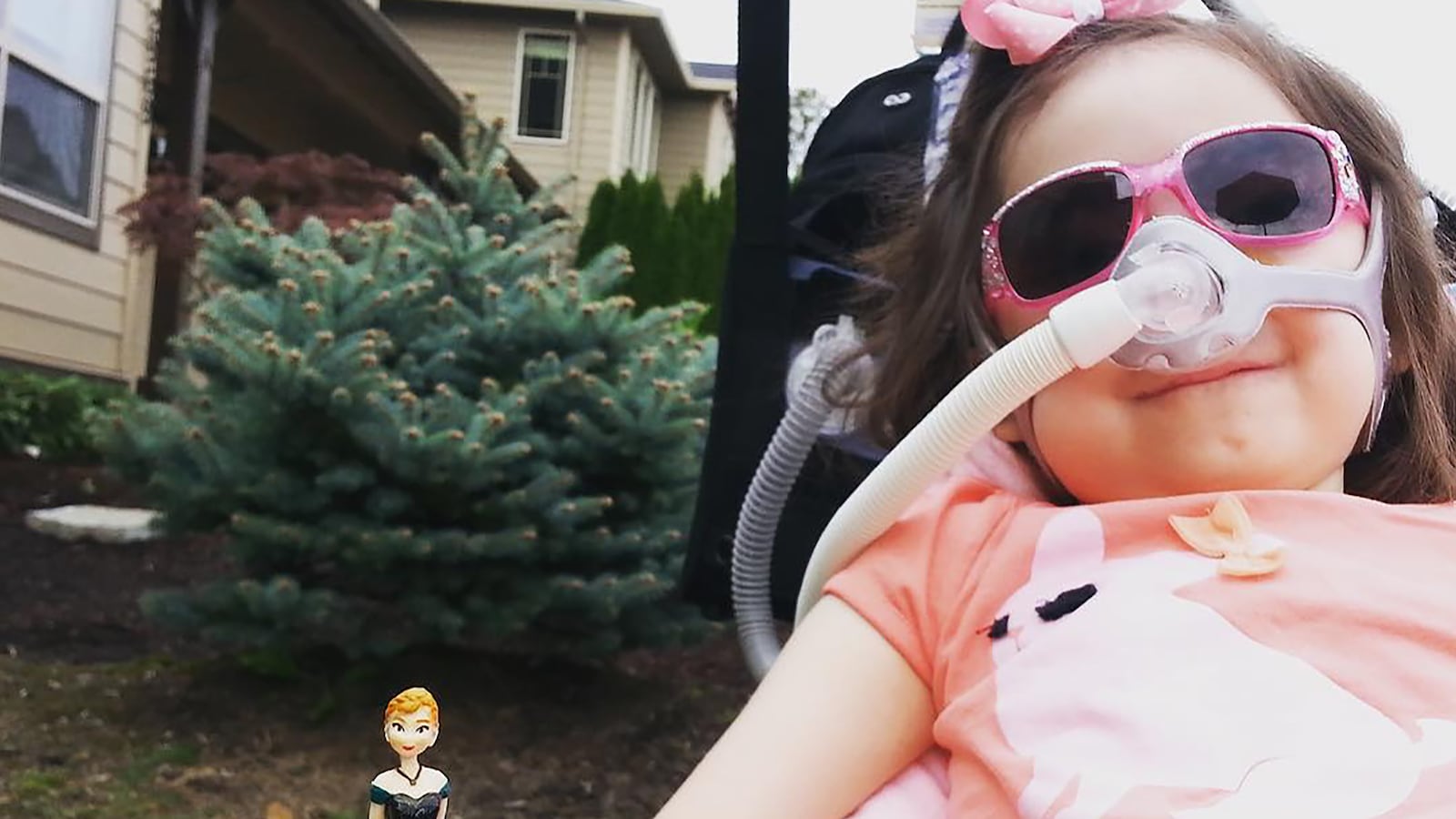Julianna Snow is 5 years old. Like many girls her age, she loves Frozen and laughing with her family. Unlike other little girls, she is likely to die soon—and has expressed her wish that she not be brought back to the hospital if and when she falls sick again.
Her parents are respecting that wish.
Julianna has Charcot-Marie-Tooth disease, a neurodegenerative condition. Doctors believe that if she gets ill, her lungs and muscles will be too weak to prevent mucus from settling in her lungs, which will be fatal.
Untreated, she will die at home, among her friends and family. Her parents could bring her to a hospital, but doctors say they will be unlikely to save her. Even if she were to be saved, then she would probably need to be sedated and on a respirator.
Her mother, a neurologist named Michelle Moon, has blogged about her own decision to respect Julianna’s wishes.
Julianna’s participation in her decision has caused an uproar by Internet commenters, who are joined in opinion (if not in tone) by noted bioethicist Art Caplan. They object to such an important decision being in the hands of a 5-year-old.
They think, probably correctly, that a 5-year-old cannot truly grasp the concept of death.
Of course, none of us really can. But 5-year-olds do not understand the permanence of death. Talk to an average 5-year-old even about the time before she was born, and you might well elicit some confusion about the possibility of a universe existing before her own awareness of it.
Critics think, then, because Julianna cannot grasp the concept of death, she cannot participate in her own medical decision-making.
However, Julianna’s input is crucial.
That’s not to say the decision should be entirely in her hands. There are reasons we don’t allow 5-year-olds full autonomous decision-making, and an all-cookie diet is only one of them. Five-year-olds are (notoriously) unable to think through the ramifications of their decisions.
When I teach bioethics, I sometimes use the following example: It would unquestionably be inappropriate (to say the least) if a husband brought his unwilling wife into a medical clinic for a vaccination, and held her down for the procedure despite her tears and protests.
But what if it’s a father bringing a child in for a vaccination? The father should ignore the protests of his child. That’s good parenting.
We do, though, or many of us do, allow 5-year-olds to participate in some decisions—even quite important ones. Suppose a kid were thoroughly miserable and bullied at his school, and begged consistently to leave. Many parents would consider changing schools if the option were available.
I don’t presume to know the unimaginable pain of Julianna’s parents. What little I do know about it comes not from any bioethics I’ve studied, but from experience.
The day my second son was born, it was clear that something was terribly wrong. His neurological function was clearly not normal, and he struggled mightily to breathe.
He had a genetic disorder, it turned out, affecting primarily his central nervous system.
He spent the first four months of his life in a neonatal intensive care unit, feeding by tube and breathing supplemental oxygen. He seemed entirely unaware of his surroundings. He spent 22 hours out of 24 sleeping, and just stared blankly for his two hours of wakefulness.
Some doctors told us he not only would never be able to walk or talk, he likely never would be aware of anything. That he would be in a state of permanent sleep. Others said that we couldn’t know that for sure, but certainly no one was optimistic.
At one point, a doctor sat us down and asked us if we’d like to consider signing an order not to resuscitate him, because, after all, what about his quality of life? She presented us with a paper listing the medical treatments we might or might not consider for him.
Being asked to decide between your child’s suffering and indignity on one hand, and your child’s death on the other, is so wretched, so counter to every parental instinct.
I am certain this decision is much more difficult for Julianna’s parents, who have gotten to know her for five years, to laugh at her jokes, to hear her laugh in turn. And they watch as their daughter grapples with her awareness of her situation.
As it happened, the doctors who had given my son such a devastating prognosis were wrong. He is unquestionably severely disabled, but we now have a healthy, happy, inquisitive, affectionate kindergartener. No serious bioethicist that I know of would say his life is not worth living.
At one point, doctors did intervene to save his life, and I am unbelievably thankful that they did.
Even though doctors were mistaken in our case, even though I know as well as anyone that prognoses might be wrong—they far more often are not wrong.
Given the facts we know about the case, between dying with friends and family or living sedated on a respirator, a decision to keep Julianna at home seems like it would be a rational one for her parents to make.
So why ask Julianna?
Because it is only Julianna who knows how much she suffers in the hospital, and how it makes her feel to be surrounded by friends and family at home. She may not understand the concept of death. But we don’t know what her life is like, information which is just as crucial to her decision.
Julianna may not understand all the ramifications of her decision. But neither do the rest of us, who simply do not know what it feels like to be Julianna.
Caplan told CNN that he was concerned that sometimes people who are dying feel pressured to make a decision by their family, and children might be especially susceptible to such influences.
This is cause for serious worry. As far as I can tell from reading her blogging, however, Moon does not seem to be leading her daughter one way or another.
I do worry, though, that her parents have told Julianna that she will go to heaven, and have been detailed and specific about what heaven will be like. They have told her that in heaven she will be able to run and play, and will be reunited with her family one day.
Of course, that’s what her family believes, so it makes sense that they told her that. However, it’s troubling that she believes that such an outcome is certain to happen. Most children would choose playing over the hospital.
Back when I was deciding for my son, I wished like hell that it wouldn’t be my decision. It’s not that I didn’t want the burden. Rather, it seemed so terribly unfair that he couldn’t be a part of that decision.
Julianna’s parents are able to hear her out. She has discussed death far more often and with more gravity than most 5-year-olds. They are right to take seriously what she has to say.






